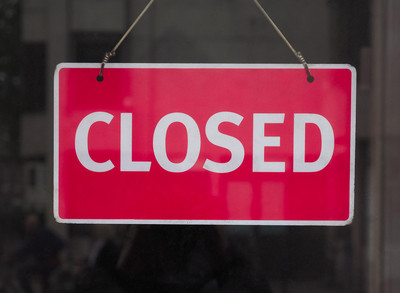 The bookmaker William Hill as announced that it has ‘entered into a consultation process’ over the possibility of closing around seven hundred of its licensed betting shops. The company has threatened to do just that from the moment that the government announced it was considering making cuts to the maximum stake applicable to Fixed Odds Betting Terminals and William Hill have cited that exact reason for the possible shop closures. If it happens then as many as 4,500 jobs could be lost as a result.
The bookmaker William Hill as announced that it has ‘entered into a consultation process’ over the possibility of closing around seven hundred of its licensed betting shops. The company has threatened to do just that from the moment that the government announced it was considering making cuts to the maximum stake applicable to Fixed Odds Betting Terminals and William Hill have cited that exact reason for the possible shop closures. If it happens then as many as 4,500 jobs could be lost as a result.
William Hill is the bookmaker with the biggest high street presence of physical shops, boasting just under three thousand stores. The next closest company is Ladbrokes, who have fewer than 2,000. William Hill employ about 12,500 people, meaning that more than third of its employees find their jobs are now at risk. The government chose to cut the maximum stake on FOBTs from £100 to £2 on the first of April 2019, William Hill claiming that they’ve seen a ‘a significant fall’ in revenue earned from gaming machines since.
It’s An Ongoing Saga

The issues surrounding Fixed Odds Betting Terminals have raged for more than a year, from the moment the government announced that it was in consultation over what should be done about the maximum stake playable on the machines. In October of 2017 the Gambling Commission released its long-awaited report into the matter, making a recommendation that the government should cut stakes to £30. That caused outrage from those keen to see the stakes slashed even further, however, as it was believed that the FOBTs were a surge on society. Given the ability for players to bet up to £100 every twenty seconds, £30 didn’t feel like enough of a cut to help the most vulnerable.
In the end the government decided to ignore the Gambling Commission’s advice and instead opted to cut the maximum stake to £2, which was the figure that campaigners wanted them to go for in the first place. As I wrote in my news piece at the time, FOBTs were responsible for around £52,000 profit per year for bookmakers, so they feared what would happen to their profits as a result of the cut. They are seen by some as a ‘licence to print money’, with player losses increasing by 73% in less than ten years, even though less than 10% of the machines were introduced over the same amount of time. It’s little wonder that bookies made numerous different threats during the consultation period.
William Hill Have Long Predicted The Need To Close Shops

One of the main threats made by William Hill since the government first mooted the idea of cutting Fixed Odds Betting Terminals’ maximum stake was the possibility of having to close some of its high street stores. It was a threat that was inline with similar ones made by the Association of British Bookmakers, who had initially suggested that as many as 21,000 people would lose their jobs as four thousand shops were closed around the country. The ABB also disputed the government’s logic for making the decision, claiming that it wasn’t likely to impact problem gambling as much as was being claimed.
Those job loss figures were always seen as being unlikely by the government, who initially used a report by KPMG to make its decision on the timing of the cuts being introduced before it was revealed that the report had been written on behalf of the gambling industry using parameters set by the Association of British Bookmakers in the first place. The assumptions were also challenged by Paddy Power, with the Irish bookies saying that the figures were ‘unrealistic’ and that the ABB’s prediction of job losses were far more severe than the reality was likely to prove.
They Delayed The Decision As Long As Possible

The announcement regarding shop closures and job losses was expected, but William Hill explored other possibilities before confirming it. The firm had written to landlords in March in order to ask them to reduce their rent requirements by 50% in order to help the company cope with the impact of the cut to the maximum stake on the FOBTs. It was a move that other retailers such as House of Fraser, Carluccio’s and Mothercare had also tried the year before as they struggled to cope with people moving to online shopping. Bettors have also moved online, but the presence of FOBTs helped the bookmakers with a high street presence cope with the slight revenue loss that was a result.
The company also attempted to make inroads into the US market, hoping that the emerging rights of punters to gamble in the United States of America would help them mitigate some of their losses that were likely to come about thanks to the cut in maximum stake. It quickly had operations in the first five states to legalise online betting, having already had a long-established based in Nevada. Philip Bowcock, the company’s Chief Executive, set an aim of improving profits made from the American market from $50m to $300m by 2023. In the end however, it was felt that neither moves would do enough to stop the company from having to close shops.
Government Should Help Those Losing Jobs

In its annual report, William Hill declared that a ‘significant revenue impact’ should be expected from the cut of £100 to £2 on the Fixed Odds Betting Terminals’ maximum stake. They said that profits were likely to be hit by between £70 and £100 per year, which was the reasoning behind the decision to consult over closing the shops. It was not something that earned sympathy from all corners, however, with Adam Bradford, who set up the campaign organisation Safe Online Gambling Group when he discovered that his father had hidden a gambling problem and was sent to jail for committing £50,000 in fraud, said that the job losses were ‘inevitable’.
Tom Blenkinsop, meanwhile, believes that the government ‘has a role to play’ in helping workers find their feet after the job losses are confirmed. The Operations Director of Community, the betting shop workers’ union, feels that the government knows that its changes to FOBT rules was likely to cause an impact, so it has to do more to protect the workers. He also called on William Hill to ask people to take voluntary redundancy and move workers into different parts of the company where possible, which the company has promised to try to do.



